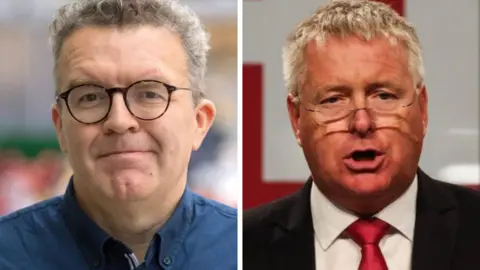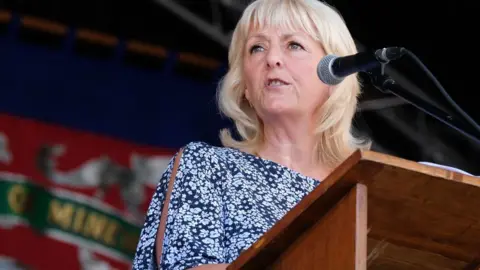Shadow cabinet clash over anti-Semitism
 PA and Shutterstock
PA and ShutterstockTwo of Labour's most senior figures had a row over anti-Semitism at a shadow cabinet meeting, sources have told the BBC.
Party chairman Ian Lavery criticised deputy leader Tom Watson over calling for a Labour branch to be suspended.
Mr Watson accused the Liverpool Wavertree branch of "bullying" their MP Luciana Berger.
Mr Lavery told him this was "unhelpful" but Mr Watson told him to tone down rhetoric about Ms Berger.
The party's deputy leader said the language used by Mr Lavery in relation to the Liverpool Wavertree case, in a Huffington Post blog, could have been seen as trying to force Ms Berger out.
Labour sources who were at Tuesday's shadow cabinet meeting said the argument between the two men had been heated and "shouty".
Another Labour source said anti-Semitism had not been an agenda item for the meeting but leader Jeremy Corbyn reported that he had received a letter about the subject.
Debate about anti-Semitism then took up the entire meeting, against Mr Corbyn's will, the source added.
Labour general secretary Jennie Formby revealed on Monday that 673 complaints in 10 months alleging anti-Semitism against party members had been made in the past 10 months, resulting in 12 expulsions.
But some Labour MPs, including Dame Margaret Hodge, said the figures could not be trusted and she herself had submitted 200 examples of alleged anti-Semitism.
 Getty Images
Getty ImagesMs Formby hit back in an email to members of Labour's parliamentary party, saying: "The 200 examples do not relate to 200 separate individuals. They relate to 111 individuals reported of whom only 20 were members."
She added: "It is clear that our team has been working extremely hard to turn these issues around as efficiently as possible.
"The constant and often public criticism of our dedicated and talented staff team is unacceptable and is causing them considerable distress.
"Of course, processes can always be improved, and I remain committed to that. I welcome the efforts of MPs to work together with us to help us resolve the issue."
Ms Formby has rejected Tom Watson's call to suspend the Liverpool Wavertee branch, after Ms Berger faced potential no confidence motions.
The motions against Ms Berger, who has been a prominent critic of Jeremy Corbyn over his handling of anti-Semitism and his position on Brexit, were withdrawn.
But Mr Watson pressed for action against the branch, saying its behaviour in planning a meeting to discuss the motions was "intolerable" and Ms Berger was clearly being bullied.
Ms Formby said there was "no constitutional basis" to take action against the branch.
And in a letter to the branch, she said she had seen no evidence of bullying or anti-Semitism. other than complaints about one individual which were being investigated.
A Labour Party source said the shadow cabinet had "welcomed the transparency of the release of the figures" on anti-Semitism investigations on Monday.
The shadow ministers had also "expressed solidarity with Luciana Berger" over the abuse that she has received.
And they had also "committed to rebuilding trust in the historic relationship with the Jewish community" and support "for the role members play in the party and party democracy".
In a blog for the Huffington Post on Saturday, Ian Lavery said: "I have no problem, as a Labour MP, with being held to account by the members who do the work to elect me. That is party democracy.
"But there has to be tolerance and respect. No-one, including MPs, should be bullied, least of all women members of parliament, some of whom, like Diane Abbott and Luciana Berger, have been subject to horrible abuse."
But he added: "It is unacceptable for either MPs or whole constituency parties to be subject to trial by social media, as happens too often in the current climate."
